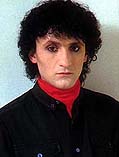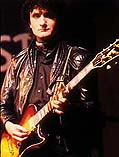

The shy leader of the band (songwriter and unofficial musical director), eloquently able to defend the band from harsh critics from behind a cool layer of make-up. Never claiming to be totally original and sighting his main influences as love of travel. Outside project (for example Riuchi Sakamoto - YMO) always fulfilled his need to experiment in different ways and relies on emotions for lyrical inspiration to a great extent. Never liked the repetition of touring.

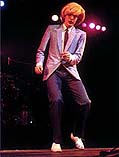
David
Sylvian - Alchemy
A
Ghost in the Moon
Rarities
Archive
Everything
and Nothing
Sideral


The restless part of the group, both on stage and in fashion. A fluid bass style borne from no formal training to constrain his feeling for the music. For him to escape the tedium of touring he turned to sculpture and specialises in unusual mutant forms of human life, the down side being the solitude when creating. He also opened the Penguin Cafe to satisfy his love of oriental foods.
"Something of a myth has grown up. The biogs always say that I'm a multi-instrumentalist and that I had a background in classical music. Yes, I was in the LSSO [London School Symphony Orchestra] as a bassoonist, but I was never really classically trained. They tried to train me, but it never really worked. As an adolescent, I'd always wanted to play an instrument. I observed that other people seemed to enjoy it, and I wanted to find the one that would make me feel the same. I tried the mouth-organ, the violin. I was unlucky in my choices. I was slow at reading music and I relied on playing music by ear. The same thing happend with the bassoon. I'd been playing for six months and there was an audition for the LSSO which my school sent me to. I went along; they were thrusting sheets of music in front of us as tests. I asked the guy next to me to play it so I could pick it quickly by ear. Somehow I got chosen and that devastated me; it was the last thing I was expecting. I was playing in an orchestra when I wasn't up to the job. Instead of being the enjoyable thing I'd envisaged, it was very traumatic." Rescue came from an unexpected quarter. "On my way home to Catford [one of London's less salubrious suburbs] after the first LSSO concert, my bassoon was stolen by a group of skinheads. They asked me what was in the case. I told them. They showed me a broken bottle. I gave them the case. It was very simple. The school wouldn't buy me another bassoon, so in retaliation I bought a bass for £5 from a kid at school and got together with David who was playing acoustic guitar." It was 1974, and transgression the order of the day. Lou Reed, Bowie, Iggy Pop and The New York Dolls were powerful presences for the youthful Karn.
("Karnal knowledge" by Louise Gray, The Wire 122, April '94.)
"Our sound was something we developed together, drawing inspiration from each other. The one thing I knew about my bass playing, was that I didn't want it to sound like anyone elses, and most of all I wanted it to be heard clearly, and not lie buried merely marking the beat."
("Mick Karn - en basartist" by Michael Dee, Musiker Magasinet 6-94, June '94. 'tis an approximation, as it's been translated into swedish, then back to english for your comfort.)
"June 1st was the 22nd anniversary of Japan's first ever concert, which happend to be at my brother's wedding. It must have sounded dreadful but, up until that point we had been writing music around songs that David had written. We were only 14, and I was the vocalist but it was only moments before the curtain went up that I froze and said, David, I can't do this - you should do it as they're your songs and you know the vocals off by heart. I was so nervous, I couldn't even remember half of the lyrics. He reluctantly became the vocalist there and then. Reluctantly, because he's never really liked the limelight, and still doesn't. It was a set decision that we made, in years to come, that I would visually take that responsibility away from him, live; that I would be the one moving around and doing crazy things so people wouldn't focus on him so much. The actual words that Dave was singing were always much more important than the melodies; he was never a very strong melody writer, so he was looking to me for that, too. I guess that was the training of making the bass the lead vocal and letting other vocals kind of sit on the surface. It was interesting."
"Japan was never successful in America; we went there in 1977, for our one and only tour, if it can be called a tour; four dates, two on the West Coast and two on the East Coast. It was at a time when punk was at its height, and we weren't accepted at all. David Sylvian really built up a phobia about ever going there again. So we never made it back - a shame. Touring with Japan was always a mixed bag; I was probably the only one who enjoyed it. David hated it, absolutely hated it."
"The tours were never long, about three or four weeks at a go, and we were supported all those years by success in Japan the country, which enabled us to tour elsewhere. Without that the band just would have dissolved. We were always disappointed by the fact that, when we would play big venues in Japan, the majority of the audience would be girls, screaming their heads off. There were never really any boys in the audience. But we found that, as the success grew in Europe, to the point of our last tour, the exactly same thing was happening over here; it was full of screaming young girls and you begin to think, What am I doing this for? Nobody's actually listening to what we're doing any more. And that made Dave feel even worse about touring, to the point of stopping completely. Things have really changed, now. I've just been to Japan for a week to do some promotion, and there seems to be a string of new bands, really young bands, admitting that they were in the audience in those days, camouflaged amongst all the girls! Way too late, off course."
("Tooth or dare" by Gibson Keddie, Bassist & Bass Techinques, Oct.'96.)
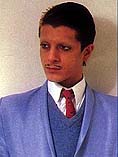
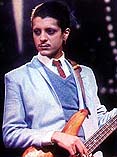
Karn's Alternative Discography
Interview in Bass
Player Magazine
The Divinity of
Rhythm
The Mick Karn
Web Project


In keeping with the group Steve had no musical training or influences, another case of feeling what was right and fitted into the band - especially Mick's bass playing. His other passion is photography, citing the fact that the band always seemed to be having photo shoots as an influence in wanting to be the other side of the lens. In the early days his shots were used for the cover of 'The Art of Parties' and to illustrate catalogues for Mick Karn's sculpture exhibitions.
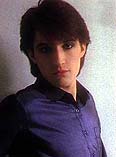

Jansen's Alternative Discography


The most reclusive member of the band who admits to being more interested in sound than music, also not much good with a keyboard but very happy on a synthesizer. He tends to build a scaffold of repeated notes and patterns for the rest of the band to negociate. An actual member of the band who likes touring (mick also does really) - saw a very healthy future for the band after Tin Drum also.
"I actually joined the group in 1974, I was in the same class as David and Mick at school, Steve was a couple of years younger. It's very hard to say what the influences were. I was into those overblown, pompous progressive bands, but I guess we were also into that whole glam thing, plus Tamla Motown." The name stuck after an industry party which the boys gatecrashed turned out to be heaving with Japanese delegates and press.
"I really enjoy touring."
"I really enjoyed making Quiet Life because it was a very happy time and it was a really consolidated group effort. Tin Drum was more painstaking and the group was beginning to slightly disintegrate. We weren't all there at the same time, and me and David spent days in the studio programming. It was a very laborious process, but more creatively satisfying. Tin drum was perhaps the first album where we actually produced something that was completely original."
("Rich pickings" by Phil Ward; interview by Andrew Jones, Keyboard Review, Sept.'94.)
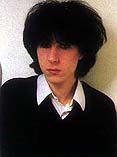

Barbieri's Alternative Discography


Always the outsider in the bands of high school friends and brothers after being hired through an ad in Melody Maker. A guitsrist was needed to allow David to concentrate on his vocals.
